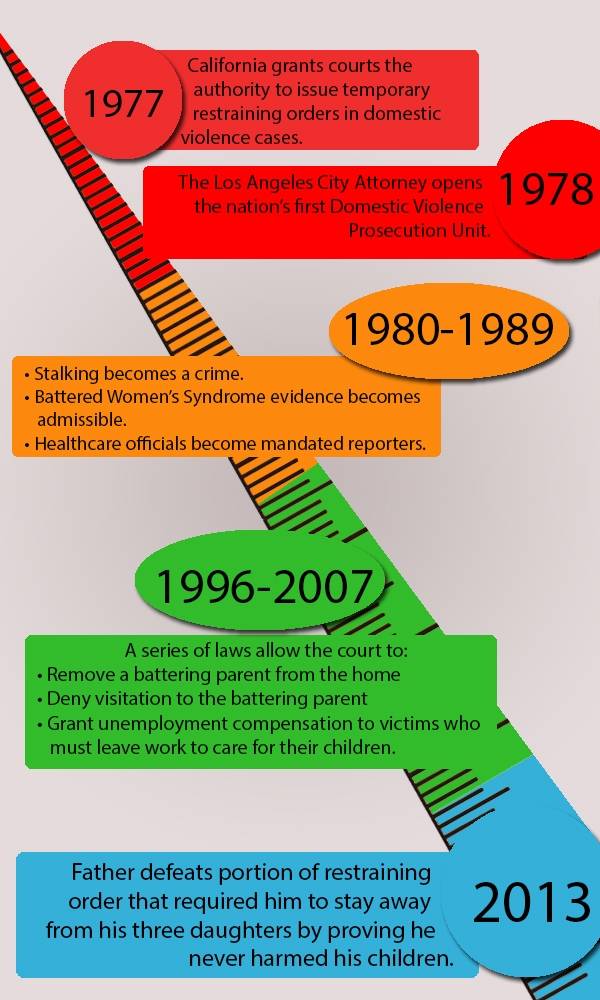If You are Involved in a Domestic Violence Case, You Still Have a Right to See Your Children
Having a domestic dispute with your spouse or partner is always a stressful situation for everyone involved. Often, a couple’s children become an unfortunate bargaining chip as they get caught in the middle of mom and dad’s disagreement. Sometimes, county agencies such as Child Protective Services (CPS) react by trying to prevent a loving father or mother from retrieving custody of his or her children. In addition, the court has the power to order that you have no contact with your kids for their protection if there is evidence that you have harmed or will harm you children in any way.
However, if you are involved in a domestic violence case, you have a right to be with your children provided that you have not harmed your children during any dispute with your spouse or partner. No one, not even a judge, can take away a parent’s right to be with his or her children if they do not require protection. If you are being denied your rights, call the California domestic violence defense attorneys at Wallin & Klarich.
2013 Ruling in the Court of Appeal

In the case of Los Angeles Department of Children and Family Services v. G.Q., A.R. (California Court of Appeals Case No. B244998; September 3, 2013), a father was denied visitation with his children even though there was insufficient evidence that he had harmed them in any way. According to court records, “[t]he children have stated they want visits with their father and are not afraid of him. There have been no reports that Father has engaged in any violent or otherwise inappropriate conduct…”
Father appealed the restraining order against him as to visitation with his three minor daughters and won. The Court of Appeals ruled as follows:
“Issuance of the restraining order was not proper unless failure to issue the order might jeopardize the safety of the children (In re B.S., supra, 172 Cal.App.4th at p. 194.) As discussed above, the record does not include sufficient evidence supporting the inclusion of the three minor daughters as protected persons under the restraining order.”
What Can I Do if I am a Parent and I Have Been Served with a Restraining or Protective Order?
If you are a parent in this situation, you need to seek representation from an experienced and skilled restraining order defense attorney in order to protect your (and your children’s) rights. For over 40 years, the attorneys at Wallin & Klarich have helped hundreds of clients who have been wrongfully denied the right to be with their loved ones. We can help you and your children overcome this challenge.
The attorney’s at Wallin & Klarich wish to share with you what a restraining or protective order involves and what your rights and responsibilities are if you should be served with one.
What is a Restraining or Protective Order?
Essentially, a restraining or protective order is an order from the court that you must “stay away” from certain persons for certain periods of time. If you are being harassed, you can ask the court to issue a Temporary Restraining Order (TRO). You become the “protected person” if the order is granted. A TRO is enforceable until a hearing date. Your harasser (the restrained person) must receive notice from you, usually best if done through your attorney, advising that a TRO is in place and that the restrained person must comply with the order. If you are the person against whom the restraining order is issued, you have the right to appear before the judge to object to it.
After the protected person files the papers with the court, a hearing date will be set. You must be served with a copy of the papers. Read them carefully. If a Temporary Restraining Order was granted, you must obey the temporary orders of the court. This may include:
- Personal conduct orders;
- Stay-away orders;
- Moving out of the house;
- No guns or other firearms while the order is in effect;
- Child custody and visitation orders (to protect children involved in a dispute).
A Temporary Restraining Order can become a Permanent Restraining Order (PRO). A permanent restraining order restrains you from making any contact with a protected person for up to five years. Since a PRO significantly restricts your liberty, the court must conduct a hearing and allow the prosecution as well as the defense to present their cases. The judge will weigh all the evidence to make a determination based on the facts.
If you have been served with a restraining or protective order, you must comply with its terms or you face arrest and criminal charges for violating a court order.
What are the Legal Requirements Necessary to Impose a Restraining or Protective Order?
A restraining or protective order is available to anyone if the following applies:
- The person has been abused or threatened with abuse; and
- The person who was abused has a certain relationship with the person who did the abuse. The relationship could include:
- Married;
- Divorced;
- Separated;
- Registered domestic partnership;
- Have a child together;
- Dating or used to date;
- Live together or used to live together (as more than roommates);
- Closely related (including immediate family members, stepparents and stepchildren, and in-laws).
What is Abuse?
Abuse is any of the following:
- To intentionally or recklessly cause or attempt to cause bodily injury to the protected person or sexually assault the protected person;
- To place the protected person or another person in reasonable fear of imminent serious bodily injury;
- To molest, attack, hit, stalk, threaten, batter, harass, telephone or contact the protected person or to disturb the protected person’s peace;
- To destroy the protected person’s property;
- Abuse can be spoken (verbal), written or physical.
In order for the court to impose a restraining or protective order, there must be substantial evidence supporting the order.
What if I Never Harmed my Children in my Dispute with my Spouse or Partner?
You cannot be legally restrained from seeing your children unless the court finds that you are a danger to them. The fact that you may have injured your spouse does not mean you are a danger to your children. The burden is on the person bringing the restraining order to prove by a preponderance of the evidence you are a danger to your children before you can be restricted from seeing them.
If you believe that your spouse or partner or a county agency has wrongfully accused you of harming your children and the court has issued a restraining order requiring you to stay away from them, you need to hire an experienced restraining order defense lawyer who can help you to contest the order and help protect your rights.
If you have been arrested for violating a valid restraining or protective order, a skilled and knowledgeable restraining order defense attorney can mean the difference between you being sent to jail and your freedom.
Contact the California Domestic Violence Defense Attorneys at Wallin & Klarich Today
If you have been charged with a restraining or protective order violation, or if you want to contest a restraining or protective order that you do not believe is valid, you need to speak to one of our attorneys experienced in restraining orders who can better inform you of your options. For over 40 years, we have been helping clients who have faced situations similar to yours. We will work hard to ensure that your rights and interests are protected.
With offices in Los Angeles, Sherman Oaks, Torrance, Tustin, San Diego, Riverside, San Bernardino, Ventura, West Covina and Victorville, our defense lawyers have successfully represented residents throughout Southern California through the restraining order process. We are available 24/7 to answer any questions you may have.
Call us today at (877) 4-NO-JAIL or (877) 466-5245 for a free telephone consultation. We will get through this together.




